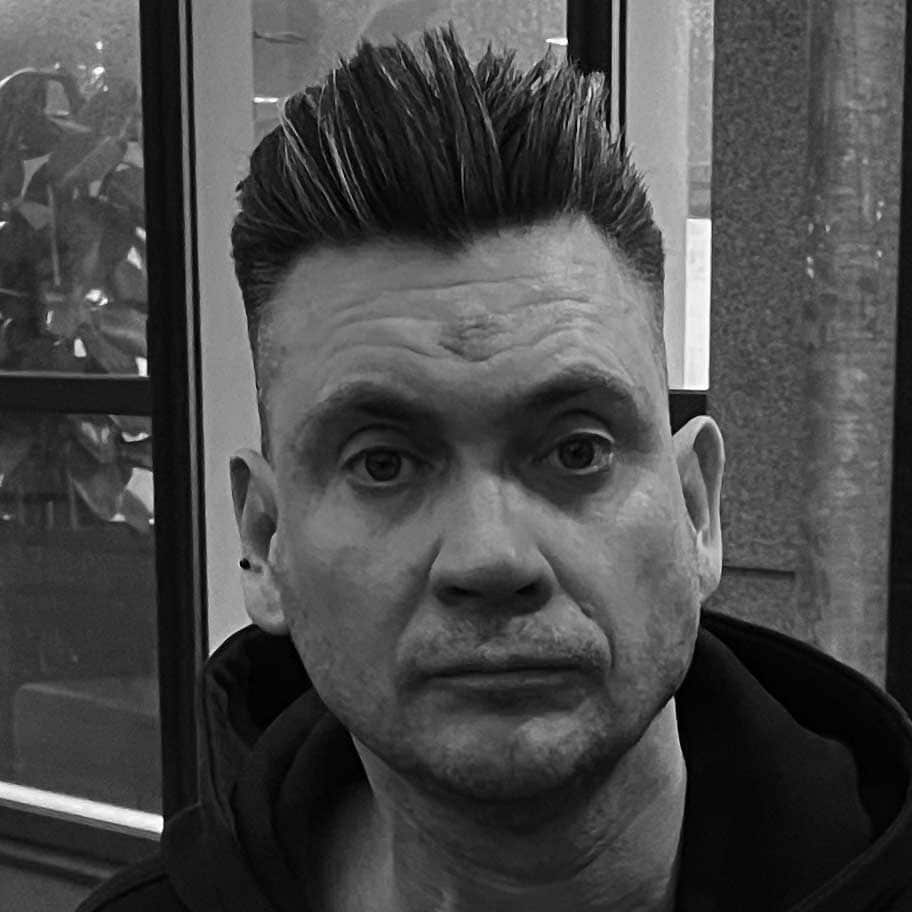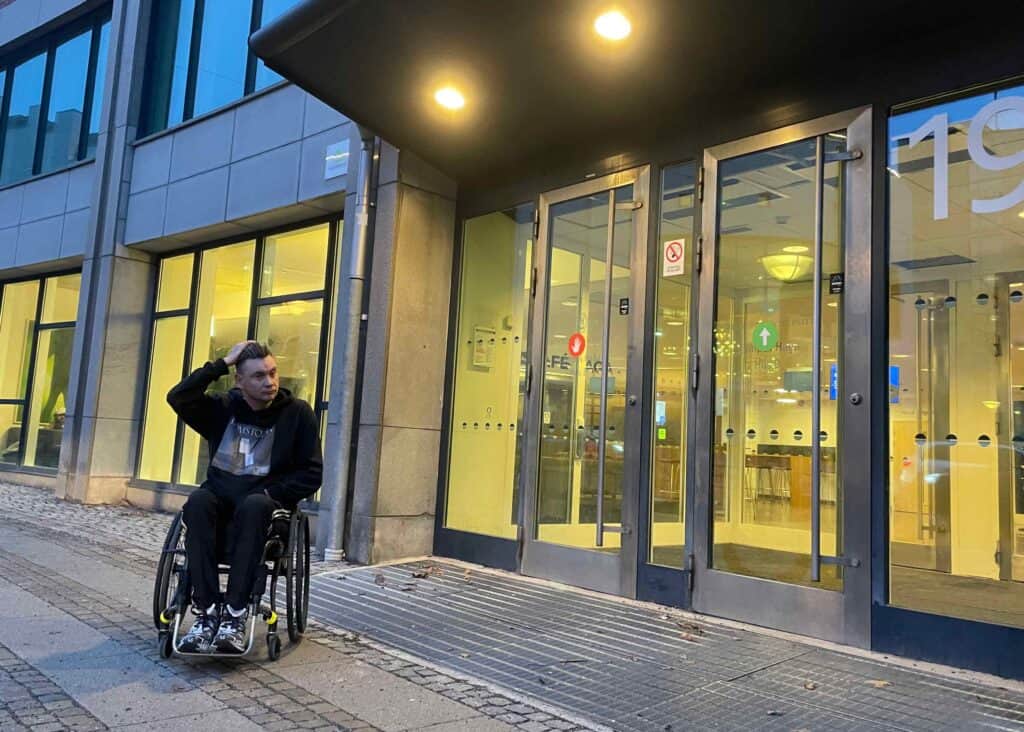On 13 December 2023, Anders Westgerd, CEO of the Gothenburg Cooperative for Independent Living, arrived at Gothenburg University’s Department of Social Sciences. He was there to give a lecture on accessibility to sociology students, a lecture that he has been giving there for almost ten years.
The lecture was to be held in the Dragonen lecture hall, which Anders Westgerd had visited several times before. The hall has staggered gallery seating with no wheelchair-accessible route to the stage. There used to be a ramp along the rows of seats, but even that posed a challenge for Westgerd, who uses a wheelchair.
”The ramp was far too long and steep, so I needed the help of at least two students to get up and down,” he says.

Anders Westgerd
CEO of the Gothenburg Cooperative for Independent Living
After each visit, Westgerd contacted the university to report his experiences. A couple of years ago, the ramp was removed, without being replaced by any other means of access. Despite that, Anders Westgerd’s lecture continued to be booked in the now completely inaccessible hall.
”I could still get in through a fire door if the alarm had been switched off in advance, but then I had to give the lecture from a platform at the back of the hall. So the students sat twisted in their seats for an hour and a half.”
Before the 2023 lecture, the university had forgotten to turn off the fire door alarm, so Westgerd had to go out to the back of the building, over a high threshold. Then he had to negotiate a curved slope, three high stone steps, another fire door with a threshold and then some more steps. As with the steep ramp, he required help from students.
”It highlights the topic of the lecture in a tragicomic way. We start the conversation about poor accessibility with the fact that I have had to be carried into the room.”
When Anders Westgerd was leaving the hall – and once again had to cross several high thresholds – an accident occurred. One of the people who was helping him gave a push and Anders Westgerd’s wheelchair flipped backwards, so he fell straight onto the concrete.
”Things could have gone really badly if I had hit my head. But I want to make it clear that I am not putting any blame on the people who helped me. It is a lot more difficult than you might think and I have incredibly poor balance, so things can happen fast. Such situations are always unpleasant,” he says.
Just over a week after the incident, he was contacted by Torun Österberg, head of the social sciences department. In an email, she regretted the incident, apologised on behalf of the department and wrote that the faculty is responsible for the premises.
According to Gothenburg University’s own accessibility policy, the faculties themselves are responsible for their premises. But ultimate responsibility for the university’s accessibility measures rests with the university’s board and executive management. Vice-chancellor Malin Broberg is a member of both.
She also regrets what happened to Anders Westgerd.
”It is of course absolutely awful. I have been in touch with the person responsible for premises at the faculty, and the university’s executive management team will look at how we will work with these issues going forward,” says Broberg.
She became vice-chancellor in July 2023, before which she was dean of the Faculty of Social Sciences. Also in that role, she was aware of Dragonen’s poor accessibility and says that she took the initiative to improve it on several occasions.
”There has been a lack of communication here. It should be clear to anyone booking that Dragonen is absolutely unsuitable to book for a lecturer who uses a wheelchair. In retrospect, it is very difficult to see exactly what went wrong, but we have made it even clearer in our booking system that the hall is not wheelchair accessible.”
Gothenburg University’s campus is spread over different parts of Gothenburg, in many different buildings. Broberg says that it is a major challenge to ensure accessibility to many of the lecture halls, especially in the older buildings.
Gothenburg University’s own policy on accessibility, which was adopted in 2017, states that the university must be accessible, open and inclusive for all students, employees and visitors, regardless of any disability. It also states that the university’s activities, premises and information must be accessible and that proactive quality-assured accessibility measures must be carried out.
What will you do to ensure that you follow your policy better in the future?
”I do not think that we have not followed it in this case. We cannot ensure that all our halls are accessible. We must ensure that there is accessibility when it is needed, and that people know which rooms and halls should be booked,” says Malin Broberg.
”There has already been work done at this faculty, where room bookers, department heads and course managers have been informed about which rooms can be booked. But we have failed in that we have not made the hall accessible to Anders.”
But knowing that for years this lecture has continued to be booked in a room that the university knows is not wheelchair accessible, have you violated your own policy?
”Yes, I must admit that we have.”
Provisions on accessibility were included in the Discrimination Act in 2015. Under the legislation, state authorities and schools are obliged to implement reasonable accessibility measures in order for people with a disability to be in a comparable situation with people without a disability. Since 2015, the Discrimination Ombudsman has received 400 reports about lack of accessibility at Swedish higher education institutions.
Universitetsläraren sent out a questionnaire with questions about accessibility measures to 38 Swedish higher education institutions. Of a total of 18 respondents, eight universities stated that they have a written accessibility policy for their premises.
One of these, the Swedish University of Agricultural Sciences (SLU), stated in the survey that they do not have an actual policy, but guidelines and procedures that comply with the Discrimination Act.
One of the eight respondents that have a policy, the University of Skövde, stated that its policy was adopted in 2014, the year before the amendments to the Discrimination Act. Two higher education institutions, Karlstad University and Karolinska Institutet, were not able to answer what year their policies were introduced.
Three of the higher education institutions – the Defence University, Linnaeus University and Gothenburg University – have not updated their policy since it was adopted. Of the eight universities that stated that they have a policy, two – Linnaeus University and Karolinska Institutet – reported that they do not have a specific time interval for how often they check that their policy is being followed.
Two of the higher education institutions – the Defence University and the University of Skövde – reported that their policy is assessed in various aspects several times a year, while three higher education institutions – Karlstad University, Umeå University and Gothenburg University – stated that their policy is checked when adaptation, refurbishment and new building projects take place.
But Anders Westgerd believes that a policy does not necessarily mean that a university actually works actively with accessibility.
”There are many fine accessibility policies in Sweden. But there is often a big difference between what organisations say and what the reality looks like. This applies to the whole of society, not just Gothenburg University,” he says.
What does lack of accessibility mean?
Lack of accessibility is when a person with a disability is disadvantaged, for example by an education provider not implementing reasonable accessibility measures to put that person in a comparable situation with people without that disability.














